Practice Makes Perfect: Ina Weisse talks about The Audition
As the COVID-19 pandemic causes film festivals around the world to forgo red carpet premieres for online editions, Trevor Hogg revisits the 44th Toronto International Film Festival with a series of interviews…
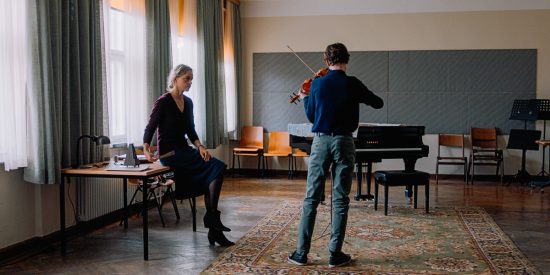
After establishing herself as an actress in German cinema, Ina Weisse directed a trilogy of short films followed by a pair of features which she co-wrote with Daphne Charizani that occurred a 11-years a part. The Audition centres around violin teacher Anna Bronsky (Nina Hoss) who accepts a pupil named Alexander (Ilja Monti) against the advice of her colleagues. “My stories are always driven by character,” notes Weisse. “It’s not driven by first act, second act and third act. Perhaps that is something to do with me being an actor.” A major task was properly casting the characters. “It took a long time to find the right cast. If you have the right person for the role then you can give them freedom. Sometimes it doesn’t work and I have to take a different approach to get what I need from them.”
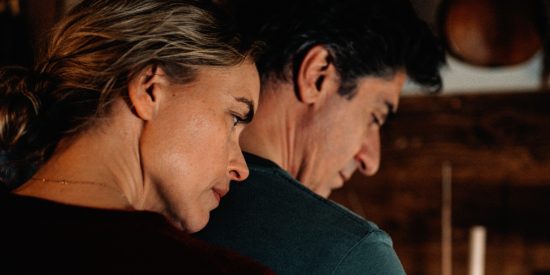
Screenwriting involves a long process of talking. “I like to write together with somebody because I can hear your thoughts and share mine,” states Weisse. “We put them together into something new. If you’re always alone you’re like an amoeba. Sometimes it’s necessary to be alone. It’s always about the idea. I love to work with Daphne Charizani; to find a good co-writer is like having a close friend or husband.” The physical abuse suffered during the childhood Anna does not get a lot of exposition but is simply shown when her father shoves the hand of his volatile grandson into an anthill. “You’re the first person to have spoken about this scene! I was afraid that it was too obvious.” While Anna has an extramarital affair, her husband Philippe (Simon Abkarian) comes across as being compassionate. “They love each other. To see that she goes with another man and to let her go; that’s freedom and love.”
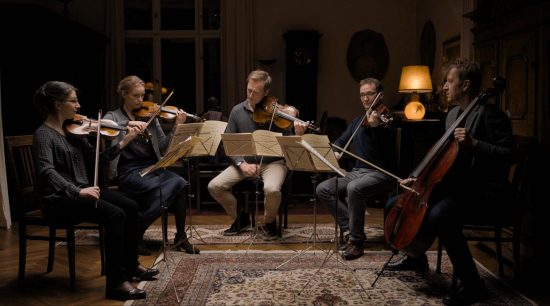
Perfection is a constant pursuit such as when Anna constantly moves from one table to the next in a restaurant while Philippe patiently goes along with her; then there is matter as to whether she endorses what her son Jonas (Serafin Mishiev) does to undermine a rival which raises the question, ‘Does one have to be ruthless in order to become brilliant?’. “I could say the opposite of that,” answers Weisse. “I know what I think but everybody has to find their own conclusion to it. I hope that people can see it from both sides.” Music had to be incorporated into the storyline. “I played for a long time the violin so it’s not strange for me. This woman has no border. My co-writer plays cello. We know a lot of these processes. It was the first time for Ilja Monti being in front of the camera. I made him run up and down the stairs sometimes for 50 minutes. With other actors you don’t have to do this but with children you have to bring them [to where they need to be]. Ilja was unbelievable because he works hard and has become good in Germany as a violinist. Ilja gets many prizes now.” Weisse adds, “You can’t fake being a musician. Acting sometimes. Ilja could do it.”
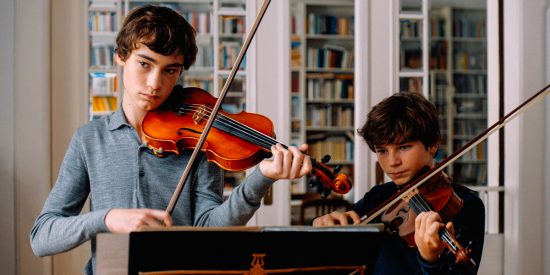
Storyboards were created; however, were not strictly abided to due the location or serendipity. “Staging is everything,” observes Weisse. “How the people are sitting. That’s the first step. Sometimes you have the storyboard in your mind and the actors don’t feel right in this position so we had to throw it away. I always have another plan. I only had 28 days. It was very short. Children in Germany can shoot four to five hours a day so you have no time. Writing is like directing. I write things that I know that I like to direct.” There was constant conversation onset. We were speaking about everything. Is it right for this person to have this camera here? I had two experiences where I was too quick in the past. We tried to be precise with everything. We did not have a lot of money. To build was too expensive. Sometimes it was hard because there was one motif that wasn’t really the character.”
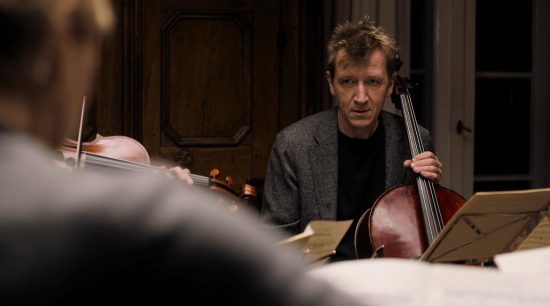
A number of movies and televisions projects shoot in Berlin making it hard to find locations. “We had a flat and two days later they say, ‘No. We can’t use the flat.’ I thought, ‘Oh, no.’ I had worked with my cinematographer Judith Kaufmann and the crew. I said, ‘We can do this here.’ This process we did three or four times. People do not want the shoot because there is no place for the car anymore. The school was a big thing. It’s not a story about we’re here at one point and another point and action. Everything must be believable. It’s a film about work not art. What is art? I wanted to show musicians working. Sometimes Judith would say, ‘It’s so beautiful here.’ I said, ‘No. It’s too beautiful. I need something not too real and beautiful.’” The visual language was influence by Ingmar Bergman and French cinema. I like François Truffaut because of his characters and the warmth in his films. But not in every film. It is the same with Bergman. I enjoy his humanity and films such as These Women. I can’t say that I want a movie made like that. Sometimes it is a point of view. It comes together from many things.”
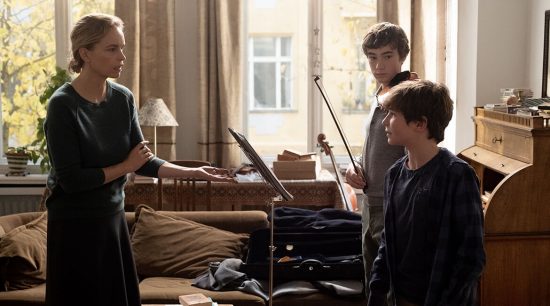
“I had a very good sound designer who made all of the Michael Haneke films,” remarks Weisse. “It’s hard with the playing and with the voices to bring them together. It was not easy to find all of the right music for the film. I didn’t if it was going to work. I chose the music. Some music was necessary for me like the “Prelude” by Bach that the young boy plays. I knew for years that I wanted to have this because I love it. In the beginning Simon Abkarian sings a famous song from The Time of the Cherries. It’s a revolution song. I know it from a big singer in Germany. Every piece of music has a history to me. When Anna is in her home with Alexander, I wanted to feel that she loves music.” One major narrative shift was made. “It was at which point that you see Anna is having an affair. It was a little before the end in the script. I thought it was not interesting. We didn’t change a lot the script in the editing. I didn’t want a casting show in the beginning. I shot a lot of musicians but decided to cut them out. My editor Hansjörg Weißbrich said, ‘You hear two and can only see the teachers.’ You can do so many things to make it bigger than it is but I never wanted to do that.”
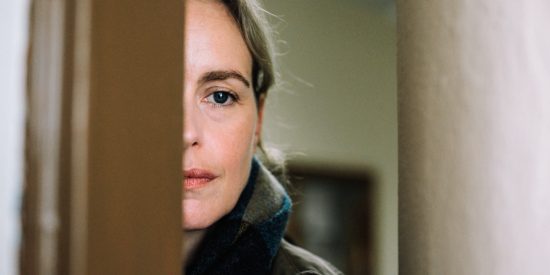
“I wanted the film to have warmth; that for me was necessary,” notes Weisse. “Sometimes Anna seems to be cold but she is not for me. I wanted to show her struggle in the pictures.” The final shot has half of the face of Anna obscured by the door while she watches Jonas practices, Weisse states, “That was always in mind because that’s the character to me. If it was a little bit more one way or the other [that wouldn’t have worked]. It’s always the perspective. It’s how you look at the story.” Numerous elements had to come together to make The Audition a cinematic reality. “Nina worked for one year to play violin. It’s not much. But she is talented. It was brilliant. This was one challenge. I hoped that Ilja who plays so well the violin could really play with Nina together. There were so many challenges. I was so happy in the end that it was okay.”
Special thanks to Ina Weisse for taking the time to be interviewed and for more information visit the official website for Unifrance.
Trevor Hogg is a freelance video editor and writer who currently resides in Canada; he can be found at LinkedIn.
Next PostPrevious Post(adsbygoogle = window.adsbygoogle || []).push({});









